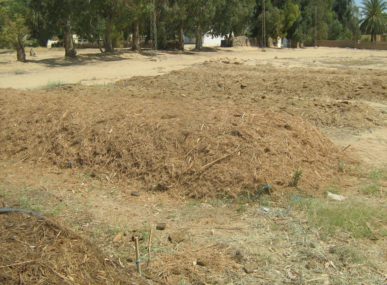An honor like “The Garbage King of Beirut” is not bestowed in a few short years, and Abichaker’s environmental interests took root long ago, in a place very different from Beirut. At 19, Abichaker began studying chemical engineering at Rutgers University in New Jersey. “After one semester, I decided this was the most boring engineering discipline ever invented,” Abichaker remembers. “But that year I took a summer elective in environmental engineering, and the next year I did research on composting. That is when I fell in love.”
Facing Beirut’s garbage problem head-on:
After finishing three engineering degrees in New Jersey, Abichaker returned to Lebanon in 1996, ready to make a change. What he found in Beirut was a city with very little recycling, and an ineffective garbage collection service performed by a single, government-backed company.
Abichaker’s plan was to circumvent this landfill sending monopoly and build smaller-scale recycling plants to serve Lebanon’s smaller communities. “Towns that were not close enough to the major cities were not served properly by the government,” Abichaker says. “They were left on their own to deal with their garbage issue, and we found a niche in that market.”
The problem with mega recycling plants, Abichaker says, is that it is nearly impossible for locations taking in more than 500 tons of recycling daily to achieve zero waste. This is what Cedar Environmental strives for in each of its dozen small recycling plants: a system that creates a circular loop, where waste comes in and none goes back out. That has not been easy and took 10 years of innovation.
To put into perspective the amount of creativity needed for a zero waste operation, consider some of Cedar Environmental’s solutions: to reuse expired pharmaceutical pills, Abichaker created a technology where they are heated to a high enough temperature that the medical component is neutralized, and then embedded in a plastic that can be used to make new items. Discarded textiles and clothing present the greatest challenge to the zero waste system. “Our next adventure will be to find something interesting to do with these,” Abichaker says. “We can use the clothing to construct some small chambers or caverns which we can then plant over — textiles are good for roots!”
Zero public awareness for zero waste:
One of the main obstacles Cedar Environmental faces is that Lebanon’s residents simply do not believe zero waste is possible. It is difficult to blame them — Beirut has gained international notoriety in recent years for the piles of garbage that pollute the shores of the Mediterranean and create a distinctive, river-like band snaking through the heart of the capital. The average resident produces up to 1.2 kilograms of solid waste each day, with more than three quarters of it destined for landfill or an open dump site. Despite the crisis, Abichaker says the infamy of the waste crisis continues to serve as an important eye-opener for many Lebanese residents.
“The problem is that the only approach we have ever had is to dump our garbage and treat it with something that has no value,” Abichaker explains. “We wanted to prove that if you change your perspective, you can use that waste as the raw material to build something new.”







